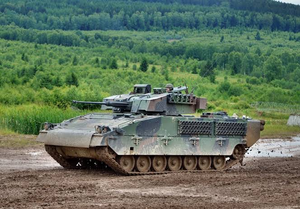CAV-32 Siafu
This article is incomplete because it is pending further input from participants, or it is a work-in-progress by one author. Please comment on this article's talk page to share your input, comments and questions. Note: To contribute to this article, you may need to seek help from the author(s) of this page. |
| CAV-32 Siafu | |
|---|---|
 A CAV-32 Siafu during training exercises. | |
| Type | Infantry fighting vehicle |
| Place of origin | |
| Service history | |
| In service | 1996–present |
| Used by | See Operators |
| Production history | |
| Designer | Xianzai Arsenal |
| Designed | 1988–1994 |
| Manufacturer | Xianzai Arsenal |
| Produced | 1996–2019 |
| No. built | 3680 |
| Variants | See Variants |
| Specifications | |
| Weight | 28.0 tonnes (30.9 short tons; 27.6 long tons) |
| Length | 6.98 metres (22 ft 11 in) |
| Width | 3.15 m (10 ft 4 in) |
| Height | 2.65 m (8 ft 8 in) |
| Crew | 3 (commander, gunner, driver) |
| Passengers | 8 combat troops |
Main armament | QF 30 mm L/80 autocannon (200 rounds) |
Secondary armament | Coaxial 7.62 mm MG-61 GPMG |
| Engine | Toyoda DEP-07 multi-fuel diesel engine 720 PS |
| Power/weight | 25.7 PS/tonne |
| Suspension | Torsion bar |
Operational range | 500 km (310 mi) |
| Speed | 72 km/h (45 mph) (road) |
The CAV-32 Siafu is a Chilokveri infantry fighting vehicle developed and produced by Arsenal Firearms.
History
Development
Operational history
Replacement
Design
General characteristics
Armament
Primary
The primary armament of the CAV-32 Siafu is a QF 30mm/L80 Chain gun mounted in a fully stabilised turret, with a rate of fire of up to 200 rounds per minute and an effective firing range of 3,000 metres. Unlike typical autocannons, the QF 30mm/L80 is not gas or recoil-operated, but instead uses an 0.75 kW DC motor for the feed and extraction of rounds. This means that misfired rounds would not impair the functioning of the weapon, as they would in a firearm which depends on the firing of a cartridge to power its action, but would instead simply be ejected by the motor. By engaging a series of clutches, gunners may select between one of two feed sprocket-driven systems for either high-explosive incendiary (HE-I) or armour-piercing fin-stabilised discarding sabot tracer (APFSDS-T) rounds for engaging soft or armoured targets respectively. 200 rounds of ammunition are stored in a ready magazine in the turret, with a further 205 rounds stored in the hull.